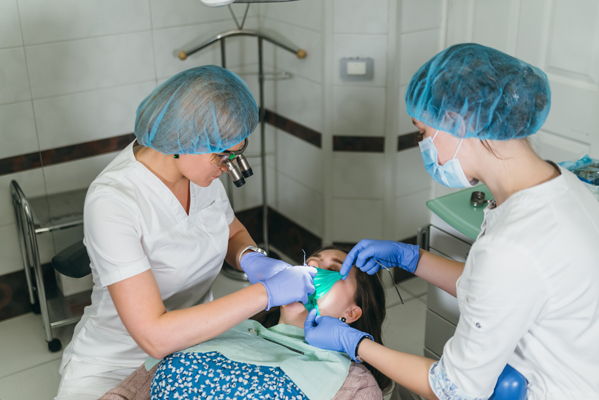Oral Surgery Procedures FAQs

Looking for more information on oral surgery procedures? According to the Centers for Disease Control and Prevention, oral surgical procedures involve the incision, excision, or reflection of tissue that exposes the normally sterile areas of the oral cavity. A few examples of oral surgery procedures include implant surgery, tooth extractions, and performing any necessary gum grafting.
Reasons for oral surgery
Have you been wondering why oral surgery is necessary? There are many different reasons why a dental patient would need this type of dental procedure, all of which are necessary to improve their overall good dental health. Some of the more common reasons a patient would need to undergo a surgical process are because they want to get dental implants, have been diagnosed with TMD, or have one or more impacted wisdom teeth.
FAQs about oral surgery procedures
The list below includes some of the more frequently asked questions people have about dental procedures that require oral surgery.
How painful are oral surgical procedures?
Some oral surgical procedures will cause more pain than others, making it necessary for patients to understand what discomfort or pain they can expect after undergoing their oral surgery. For the most part, patients will need to rest for a few days after undergoing an oral surgical process. After that, they will be given any necessary pain medications to help them manage their pain levels.
How long does it take to place dental implants?
It takes a dentist about one hour to place a dental implant in a patient's mouth. While the initial placement does not take very long to perform, getting implants is a months-long process. It takes time for the implant to fully heal, which means the patient will need to make multiple appointments when they choose implants as their tooth replacement option.
Is oral surgery necessary to extract impacted wisdom teeth?
Yes. When a dental patient's wisdom teeth are impacted, they must undergo a surgical process to extract the teeth from the mouth. General dentists often perform surgery on patients with one or more impacted wisdom teeth if the surgical process is considered a simple wisdom tooth extraction.
How long does it take to recover from a gum graft?
Once a patient undergoes the surgical process of having a gum graft performed, they can expect it to take between three days to two weeks to recover from the surgery. As a result, it is essential for all patients to carefully follow the aftercare instructions given to them by their dentist. Examples of instructions include only eating soft foods, relaxing, and being careful when brushing and flossing.
Do you need oral surgery?
Now that you understand more about oral surgery procedures, are you in need of an appointment? The only way you can know whether oral surgery is in your near future is to make an appointment with a dentist for a full mouth evaluation. Once you undergo this evaluation, the dentist will create a customized dental treatment plan tailored to your specific needs. These plans will inform you of the steps you need to take to have a completely healthy mouth.
Request an appointment here: https://www.dentalgroupofanaheim.com or call Dental Group of Anaheim at (714) 262-4224 for an appointment in our Downey office.
Check out what others are saying about our dental services on Yelp: Oral Surgery in Anaheim, CA.
Related Posts
A strong relationship with a family dentist gives households a trusted partner in oral health. With regular visits, clear guidance, and practical tips, families learn how to protect their smiles through each stage of life. For instance, daily brushing and flossing, thoughtful food choices, and consistent professional care work together to reduce the risk of…
A dental crown is a common restoration that provides essential protection and structural support for damaged or weakened teeth. Over time, even the most durable dental crown can experience wear, misalignment, or develop issues that compromise your oral function and health. Here are five signs that indicate it is time to replace or refit a…
A root canal restores a damaged or infected tooth without removing it, and recovery usually proceeds smoothly with the right care. Mild tenderness is common as the tissues calm down, especially when chewing or when the tooth is touched. Good oral hygiene, smart food choices, and timely follow-up help the tooth feel normal again. Because…
Implant-supported dentures deliver stable chewing, confident speech, and a natural appearance for patients who struggle with loose plates or frequent sore spots. This approach anchors a full arch to dental implants, creating a secure foundation that resists slipping during meals and conversations. With careful planning, the treatment protects bone health, restores balanced bite forces, and…
